Putin says Russia is working to free hostages in Gaza conflict ... Putin Assures Jewish Leaders On Hostages ... South Caucasus Turns Away From Russia Toward Middle East ...
-Putin and Israeli Hostages: I took them, and I will give them back! My honest BEARDED word!
— Michael Novakhov (@mikenov) February 8, 2024
-
Путин: Я их взял, Я их и отдам! Моё честное бородатое слово!https://t.co/JAv0eUTBgt#Россия #Путин pic.twitter.com/M8dYaZFFbn


Published on Feb 08, 2024 02:14 PM IST
Russian President Vladimir Putin said that Moscow is working on freeing hostages held in captivity by Hamas in Gaza. Putin said this after meeting Russia’s chief rabbi, Berel Lazar, and the head of the Federation of Jewish Communities, Alexander Boroda, in the Kremlin. Putin claimed that Moscow had achieved “specific results” in its diplomatic efforts using its contacts within Hamas’s political wing. Watch this video to know more. #putin #hamas #hostages #moscow #kremlin #vladimirputin #russia #hostagedeal #jews #jewishcommunity #rabbi #berellazar #alexanderboroda #hamasleadership #israel #us #hostagerelease #palestine #twostatesolution #antonyblinken #mahmoudabbas
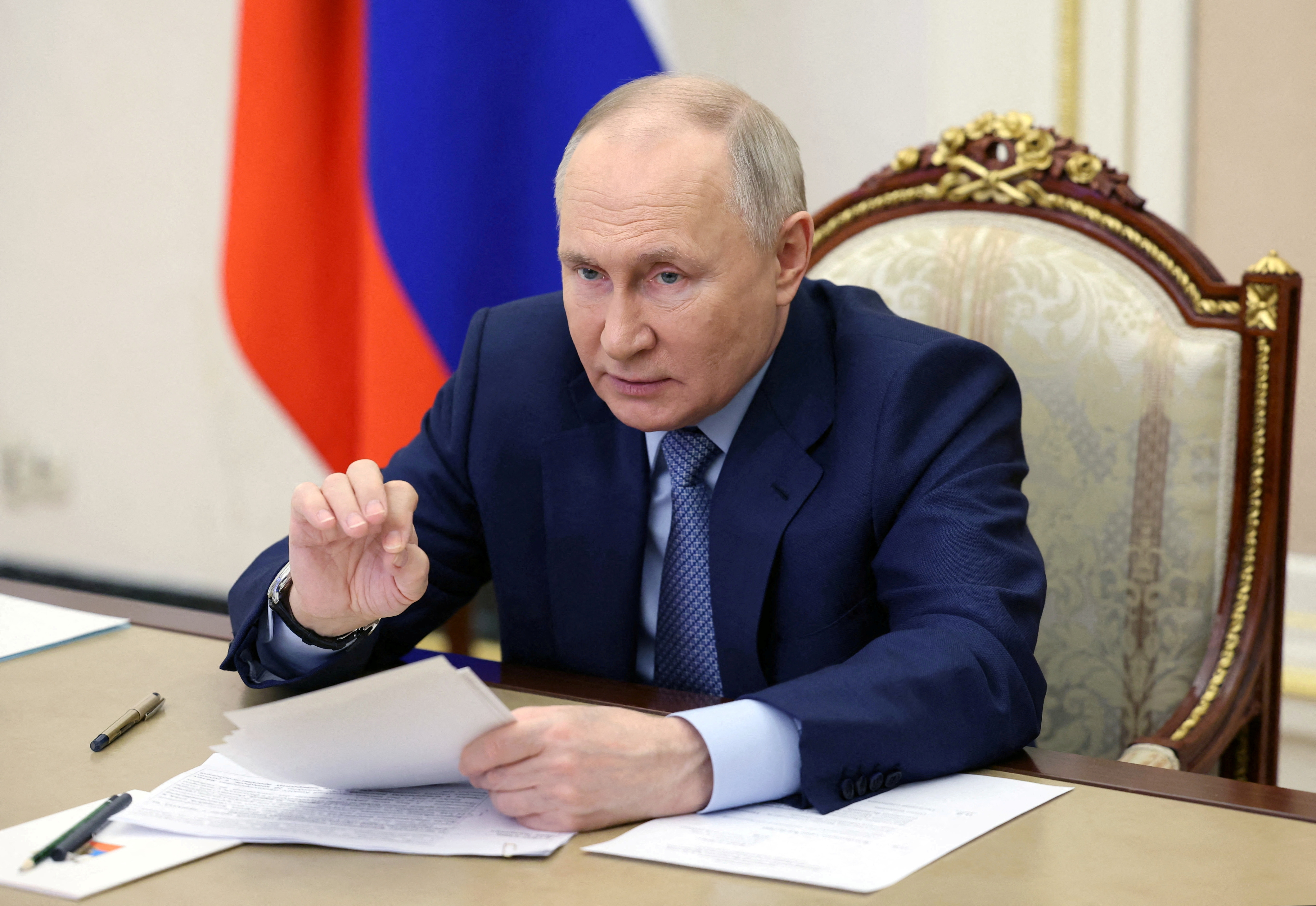
The agencies said Putin made the comments at a meeting with Russia's chief rabbi, Berl Lazar, and the head of the Federation of Jewish Communities, Alexander Boroda. Putin said Russia had made use of its contacts with the political wing of Hamas.
"You know, since the situation became more tense in the Middle East, Russia has been doing everything to help people who became hostages," Putin was quoted as saying.
"As is known, our Foreign Ministry worked through the political wing of Hamas and, on the whole, there have been specific results."
Putin did not elaborate, according to the reported comments.
Moscow's efforts, though directed at helping Russian nationals, also sought to help others, the president said.
"They include elderly people and their family members who survived the Holocaust," he was quoted as saying.
"But I know, I understand, that it is vital to carry on with these efforts. And that is what we are doing."
Moscow also has said the violence in the Middle East is a reflection of U.S. policy failures in the region.
Putin's reference to Holocaust survivors comes a day after Russia's foreign ministry told the Israeli ambassador, Simona Halperin, of its "negative reaction" to her criticisms of Foreign Minister Sergei Lavrov and Russian policy.
Authorities criticised her "unacceptable comments" in an interview with Russian newspaper Kommersant in which she said Lavrov had played down the importance of the Holocaust and that Russia was too friendly with Hamas.
Reporting by Ron Popeski Editing by Bill Berkrot
Our Standards: The Thomson Reuters Trust Principles., opens new tab

Even if the prime minister and defense minister aim to weaken Hamas' standing in the negotiation, their endless talk about Hamas leaders' assassination seems to have replaced actions
Feb 7, 2024 4:56 pm IST
Get email notification for articles from Ravit Hecht Follow
Feb 7, 2024 4:56 pm IST
Once, not that long ago, when this country was not as disordered and broken as it is today, politicians would take credit for military actions and assassinations, only in retrospect, once they had actually happened.
President Vladimir Putin told leaders of Russia's Jewish community on Wednesday that Moscow had achieved "specific results" in diplomatic efforts to free hostages caught up in Israel's conflict with Hamas, Russian news agencies reported.
The agencies said Putin made the comments at a meeting with Russia's chief rabbi, Berl Lazar, and the head of the Federation of Jewish Communities, Alexander Boroda. Putin said Russia had made use of its contacts with the political wing of Hamas.
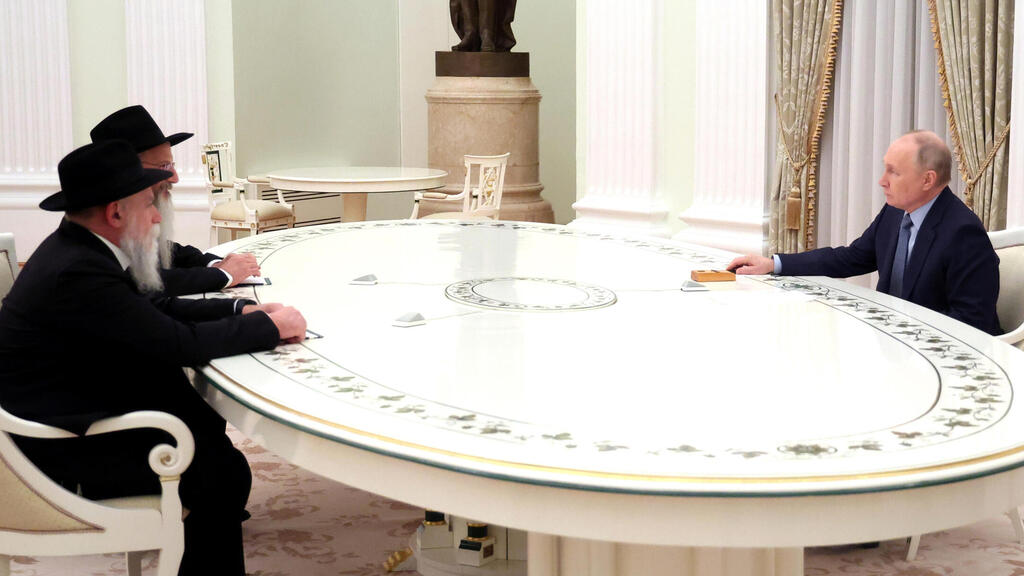

Russian President Vladimir Putin, right, speaks to Chief Rabbi of Russia, Berel Lazar, second left, and President of the Federation of Jewish Communities Alexander Boroda at the Kremlin
(Photo: Sergei Fadeichev / Sputnik / via AP)
"You know, since the situation became more tense in the Middle East, Russia has been doing everything to help people who became hostages," Putin was quoted as saying. "As is known, our Foreign Ministry worked through the political
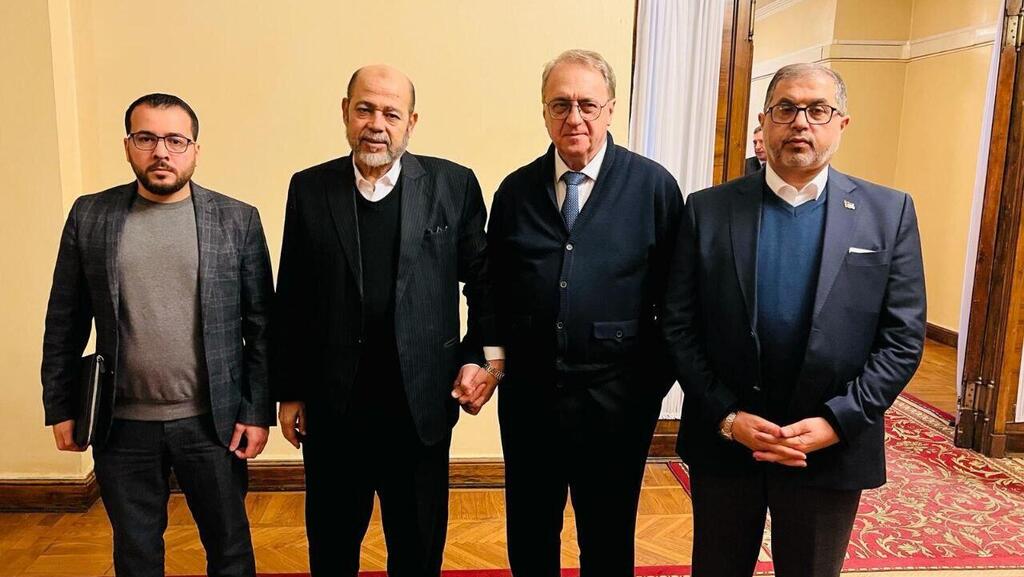

Senior members of the Hamas terror group visit Moscow as guest of the Russian Foreign Ministry last month
wing of Hamas and, on the whole, there have been specific results." Putin did not elaborate, according to the reported comments.
Moscow's efforts, though directed at helping Russian nationals, also sought to help others, the president said. "They include elderly people and their family members who survived the Holocaust," he was quoted as saying. "But I know, I understand, that it is vital to carry on with these efforts. And that is what we are doing."
Russia, which has drawn closer to Israel's arch-rival Iran since the outbreak of the nearly two-year-old Ukraine conflict, has restated its support for Palestinian statehood, and criticiזed Israeli military action in the Gaza Strip and has said the violence in the Middle East is a reflection of U.S. policy failures in the region.
Authorities criticiזed her "unacceptable comments" in an interview with Russian newspaper Kommersant in which she said Lavrov had played down the importance of the Holocaust and that Russia was too friendly with Hamas.
Israel won’t accept Hamas’s latest terms for a hostage deal, Prime Minister Benjamin Netanyahu told reporters on Wednesday but he did not rule out continued negotiations for an acceptable agreement to secure the release of the remaining 136 hostages held in the enclave
“From what I saw, even you would say no” to Hamas’s offer, Netanyahu told the reporter who quizzed him on the proposal. It included a demand for a permanent ceasefire, an IDF withdrawal from Gaza. and the release of terrorists jailed for killing Israelis.
“Surrendering to the delusional demands of Hamas ..will not lead to the release of the hostages. It will only invite another massacre,” Netanyahu said, referencing the October 7 attack against southern Israel in which over 1,200 people were killed and another 253 were seized as hostages.
“I would like to emphasize again - there is no other solution than total victory. If Hamas survives in Gaza, it is only a matter of time until the next massacre,” Netanyahu stressed.
“The evil axis of Iran and its affiliates will continue unhindered its campaign of killing and aggression,” Netanyahu explained.
“We have no obligation to the crazy terms Hamas is talking about.. including the part about [releasing terrorists] with “blood on their hands,” Netanyahu said, stressing that “we have not committed” to that.
There is supposed to now be “a process of negotiation through mediators but from what I have seen, Hamas is not there.”
Advertisement
Defense Minister Yoav Gallant issued a press statement explaining that "Hamas' answer was formulated so that Israel would refuse it.
“Its position will lead to the continuation of the war, and send our forces to other places in Gaza, soon,” he said, as he hinted at a military operation in Rafah by the Egyptian border.
Still, Hamas official Osama Hamdan said in a press conference on Wednesday that it was sending a delegation headed by Hamas official Khalil Al-Hayya to Cairo Thursday to pursue ceasefire talks with Egypt and Qatar.
Hamas: Netanyahu comments are form of 'political bravado'
Another Hamas official Sami Abu Zuhri told Reuters that “Netanyahu’s comments are a form of political bravado, indicating his intention to pursue the conflict in the region," Abu Zuhri said. "The movement (Hamas) is prepared to deal with all options.”
US Secretary of State Antony Blinken who is in Israel as part of his whirlwind Middle East tour to advance a hostage agreement and a normalization deal between Israel and Saudi Arabia put a more optimistic spin on the situation.
He told President Isaac Herzog that the US and Israel were looking “intensely” at Hamas’s response.
“There's a lot of work to be done, but we are very much focused on doing that work and hopefully, being able to resume the release of hostages that was interrupted so many months ago.”
Blinken has hoped that a prolonged pause to the war would lead to a ceasefire. At the Jerusalem press conference on Wednesday night, Netanyahu stressed, that Israel’s military campaign to oust Hamas from the enclave must continue.
“The continuation of military pressure is a necessary condition for the release of the hostages,” Netanyahu said as he stressed that victory was within his grasp.
The Israeli and American officials spoke out one day after Hamas issued its counterproposal to a US-Israeli framework understanding by which to free the hostages.
Hamas’s insistence on a prolonged pause to the war of 135 days, a permanent ceasefire, and a complete IDF withdrawal from the enclave, doused optimism that the release of the captives was around the corner.
It pointed to the complexity of what is likely to be a protracted process.
Hamas called for a three phased process in exchange for a permanent ceasefire, according to a document seen by Reuters
During the first 45-day phase, all Israeli female hostages, males under 19 and the elderly and sick would be released. In exchange Palestinian women and minors held in Israeli jails on security-related charges would be freed and the IDF would withdraw from populated areas in Gaza.
Implementation of the second phase would not begin until the sides conclude “indirect talks over the requirements needed to end the mutual military operations and return to complete calm.”
The second phase would include the release of remaining male hostages and full Israeli withdrawal from all of Gaza. Bodies and remains would be exchanged during the third phase.
A source close to the negotiations said the Hamas counterproposal did not require a guarantee of a permanent ceasefire at the outset, but that an end to the war would have to be agreed upon during the truce before final hostages were freed.
A second source said Hamas still wanted guarantees from Qatar, Egypt, and other friendly states that the ceasefire would be upheld and not collapse as soon as the hostages were freed.
“They want the aggression to stop and not temporarily, not where (the Israelis) take the hostages and then the Palestinian people live in a grinder.”
Hamas’s proposal – a response to an offer sent last week by Qatari and Egyptian mediators and cleared by Israel and the United States – came during the biggest diplomatic push yet for an extended halt to the fighting.
Hamas has asserted that Israel’s military campaign to destroy it has caused over 27,000 fatalities in Gaza. Israel has claimed that over 9,000 of them are combatants.
A temporary week-long truce in November saw the release of 105 hostages in exchange for the release of some 240 Palestinian security prisoners in Israeli jails. Another five hostages were freed separately and the bodies of 11 captives were returned to Israel.
Earlier in the day, Blinken met with Netanyahu for what the Prime Minister’s Office described as a “lengthy private” meeting.
They were joined for an expanded meeting with US and Israeli officials, including Defense Minister Yoav Gallant, Strategic Affairs Minister Ron Dermer, Mossad Chief David Barnea, and IDF Chief-of-Staff Herzl Halevi. Blinken also met separately with Gallant.
Six women who were kidnapped to Gaza in October and were released in November ceasefire held a press conference right after Netanyahu, in which they pled with him to accept Hamas’ terms.
Adina Moshe, 72, from Nir Oz said, as if she was addressing Netanyahu, ”If you continue in this line of destroying Hamas, there will be no hostages left to save.” It’s presumed that 31 of the hostages held in Gaza are dead, and relatives of the captives fear that more will die if there is a protracted negotiation process.
Sharon Aloni-Kunyo, 34, from kibbutz Nir Oz, who was released with her two three-year-old daughters, Yuli and Emma, from captivity, is still waiting for her husband, David, to return.
She said, "136 hostages are waiting without oxygen, food, or hope to be saved," adding, "The price is high, but abandoning the hostages is a historical stain.”
Reuters and Jerusalem Post Staff contributed to this report.
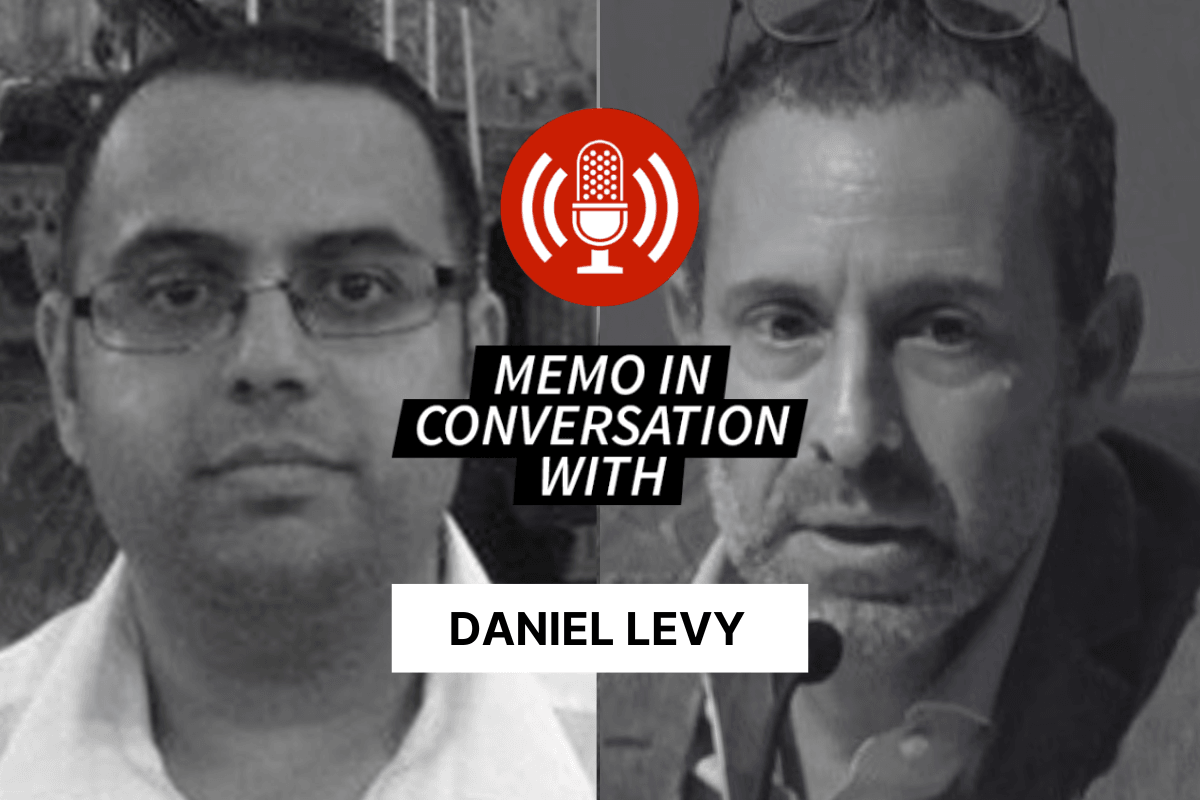
On 6 October 2023, Israeli leaders were feeling confident of their international standing. Normalisation with the UAE, Bahrain, Morocco, Sudan and talks in the air about impending normalisation with Saudi Arabia. The Palestinian issue seemed forgotten, the status quo allowed Tel Aviv to close Gaza off from the world, settlers to steal more land in the occupied West Bank and everyone seemed to have given up on the idea of a Palestinian state. On 7 October, Israel’s sense of invincibility and security with the status quo came crashing down. But despite the political disaster of the Hamas attack, some within the Israeli government saw it as an opportunity to expel and ethnically cleanse Gaza of Palestinians, believing they would have immunity. However, the ongoing atrocities playing out in full view of the world, with growing anger in the West, outrage in the international community and a genocide case in the International Court of Justice (ICJ) indicate that Israel has lost a lot of its international legitimacy. Additionally, with talks of a ceasefire and the failure of the Israeli occupation army to crush Hamas, Israel has been left unable to achieve any of its stated goals in Gaza. Join us as we speak to former Israeli negotiator Daniel Levy on what the current situation means for Israel and for Palestinians.
Daniel Levy is the president of the US/Middle East Project (USMEP), which strives to advance a dignified Israeli-Palestinian peace; an end to occupation, discrimination and refugeehood in which international legality is upheld, respecting the rights of all people.
From 2012 to 2016, Levy was director for the Middle East and North Africa at the European Council on Foreign Relations. Prior to that he was a senior fellow and director of the New America Foundation’s Middle East Taskforce in Washington D.C. Levy was a senior adviser in the Israeli Prime Minister’s Office and to Justice Minister Yossi Beilin during the Government of Ehud Barak (1999-2001). He was a member of the official Israeli delegation to the Israel/Palestine peace talks at Taba under Barak and at Oslo B under Yitzhak Rabin (1994-95).
Levy was born and educated in the UK where he now resides and where he graduated with an MA and BA from King’s College, Cambridge. He has testified before the UN Security Council three times during 2020-2022.
READ: Palestinians inspect their demolished homes as Israel withdraws from northern Gaza
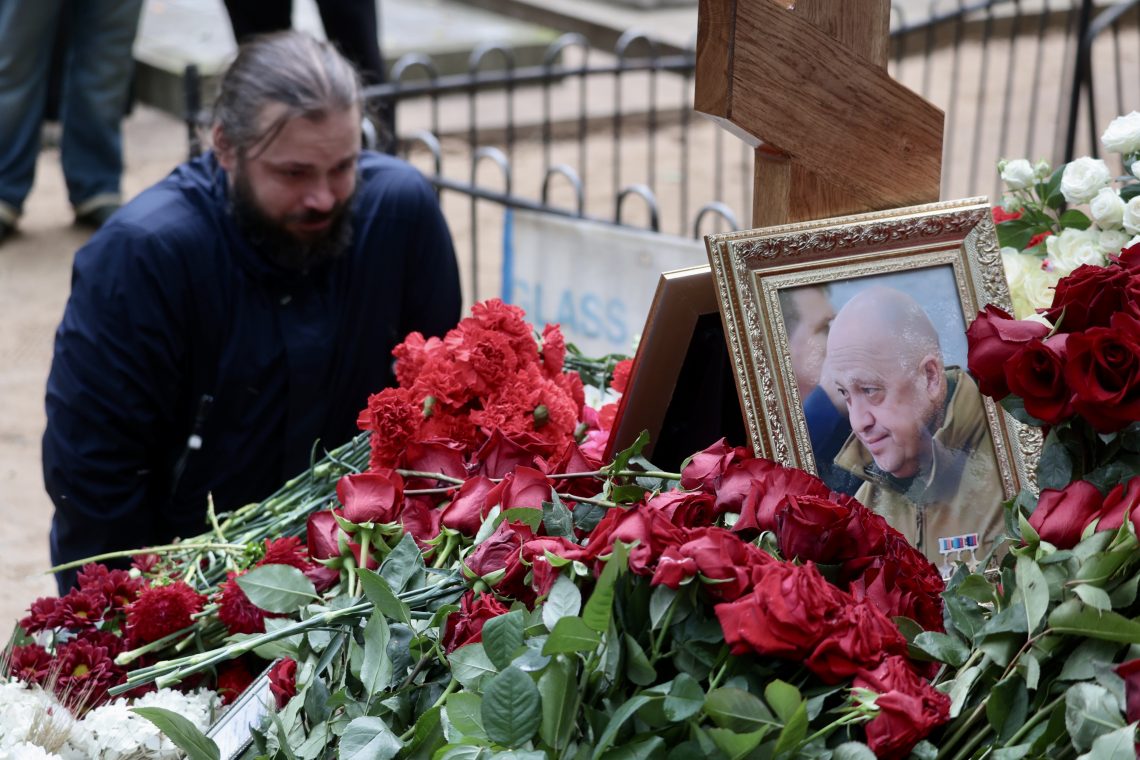
The rise and fall of mercenary leader Yevgeny Prigozhin offers intriguing insight into the dangerous state of Vladimir Putin’s Russia.
 A man sits near the grave of Yevgeny Prigozhin, who was killed in a plane crash, at Porokhovskoye Cemetery in St. Petersburg, Russia, on August 30, 2023. © Getty Images
A man sits near the grave of Yevgeny Prigozhin, who was killed in a plane crash, at Porokhovskoye Cemetery in St. Petersburg, Russia, on August 30, 2023. © Getty Images- The war in Ukraine threatens to undermine the Kremlin’s authority and control
- Prigozhin’s brand of privatized violence may spread in Russia if Ukraine prevails
- Should Russia win, the armed forces will be rebuilt and repression will flourish
Russia’s latest invasion of Ukraine brought to the fore one of the murkiest features of its military forces, that of the Private Military Company (PMC) Wagner and its firebrand leader, Yevgeny Prigozhin. The mutiny that Prigozhin instigated on June 28 was a truly unique event. It was striking that the leader of a mercenary outfit may have come close to seizing the Kremlin.
The story offers two intriguing facts. One is that the Wagner forces succeeded in swiftly seizing the headquarters of Russia’s Southern Military District in Rostov-on-Don, which coordinates the war against Ukraine, and the other is they managed to advance close to Moscow without encountering any opposition. The enigma lies in how these two facts may be explained.
One possibility is that Prigozhin had support from inside the military establishment, where many commanders have been frustrated by how poorly the war has been prosecuted. That suggests that another military insurrection could be in the cards. Another possibility is that the absence of a response was due to a paralysis of power. When Russian President Vladimir Putin was too terrified to issue orders, and senior officials were scrambling their private jets to escape, senior military commanders may have opted to stand by. This indicates that the center of power may be about to implode.
No matter what the real story was, a third fact is that less than two months later, Prigozhin was dead. He met his end on August 23, 2023, when his private plane crashed en route from Moscow to St. Petersburg. All 10 on board perished, including three crew members and Prigozhin’s right-hand man, Dmitry Utkin. DNA tests allegedly showed that the human remains matched the list of passengers. That was the formal end of the Wagner saga.
The fallout of Azerbaijan’s victory over Armenia
Russian arms exports in a tailspin
The problem-ridden development of a Russia-Iran axis
The rise and fall of Prigozhin and his PMC speaks volumes about the state of the Russian Armed Forces, the nature of the political system that Mr. Putin has created to cement his power and the culture of extreme violence that permeates not only the armed forces but Russian society.
The use of private military contractors is not specific to Russia. During its wars in Iraq and Afghanistan, the United States made use of the Blackwater company (rebranded as Academi), and other countries have similar arrangements. What is specific about the case of the Russian Wagner group is its place and role within the hierarchy of power.
One of the peculiarities is that private military companies are formally illegal in Russia. Given the general Russian contempt for the rule of law, this may seem an irrelevant observation, but it has played an important role in how Wagner developed. Having no legal rights, Prigozhin was dependent on playing the games of the Russian underworld. Up until his death, he showed excellent skills in doing so.
The Wagner group was created under the aegis of the GRU, the Russian military intelligence service. It was headquartered at a well-known GRU base. During combat, it had access to GRU airlift, and its wounded were treated in GRU hospitals. That tells us that the GRU viewed Wagner as a valuable addition to its already considerable capabilities.
The first signs of Wagner mercenaries in action appeared during the war in Syria. There, they proved useful, undertaking dirty operations that were beyond the pale even for the otherwise brutal official Russian army. Following their appearance in that war, Wagner mercenaries would appear both in Ukraine, where they won a reputation as a more effective fighting force than the regular army, and in Africa, where unsavory regimes have found them helpful as protection.
These developments provide valuable insights into the state of the Russian Armed Forces. That a mercenary unit like Wagner was tasked with frontline duties in Ukraine should not be taken as a sign that it constitutes a professional fighting force. The only case where it had been in combat with a modern professional military was in 2018 in Syria, when around 500 pro-Syrian government troops and Russian mercenaries got into a nearly four-hour-long firefight with about 40 members of the U.S. Delta Force and Rangers at a small outpost near the city of Deir ez-Zor. That encounter ended with a spectacular defeat for the attackers who suffered massive casualties – 200 to 300 dead – while none of the Americans were harmed. The incident proved that a band of thugs parading as a military force is easy prey for a truly professional combat unit.
Wagner personnel winning a reputation as better soldiers than the regular Russian armed divisions, outperforming even the elite airborne forces, sends an important message about how a Russian army would perform in combat against NATO. This insight has most probably been taken to heart by the Russian military command, if not by the Kremlin itself.
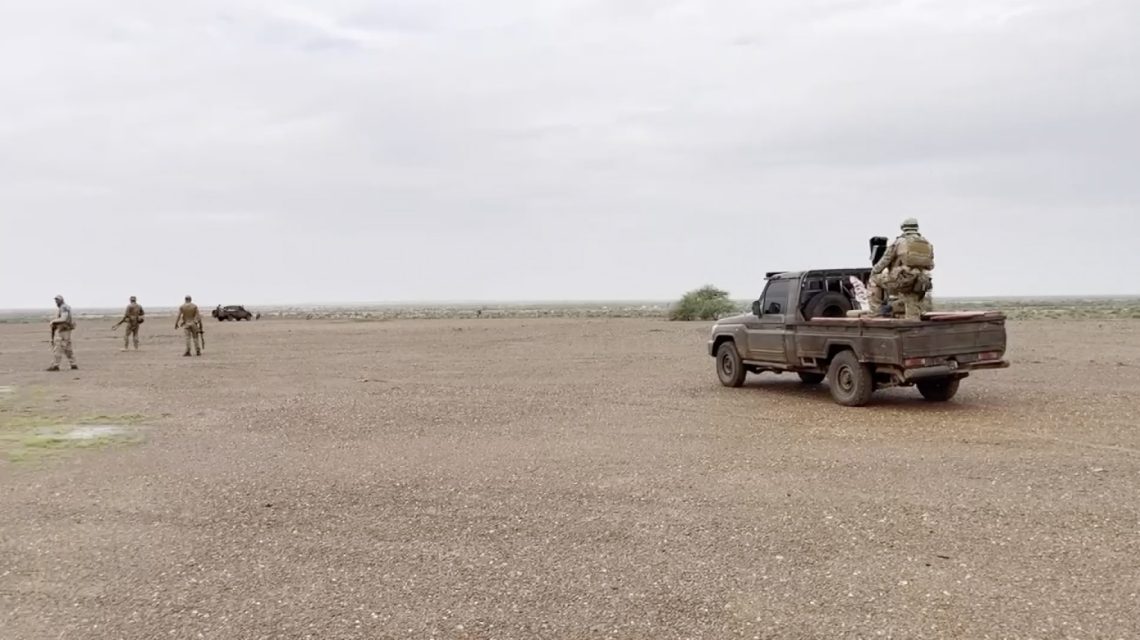 A screen grab captured from a video shows Russian Wagner mercenaries in an unspecified desert area of Africa on August 21, 2023. The image comes two days before the private military company’s leader, Yevgeny Prigozhin, was killed in a plane crash between Moscow and St. Petersburg in Russia. He bragged that Wagner had made Russia “even greater” on all continents. © Getty Images
A screen grab captured from a video shows Russian Wagner mercenaries in an unspecified desert area of Africa on August 21, 2023. The image comes two days before the private military company’s leader, Yevgeny Prigozhin, was killed in a plane crash between Moscow and St. Petersburg in Russia. He bragged that Wagner had made Russia “even greater” on all continents. © Getty ImagesAnother important message from the Wagner saga concerns Prigozhin’s personal career. Having started in petty crime, he moved into catering and ended up as the leader of a mercenary force that won global notoriety. His catering skills won him a reputation as “Putin’s chef” (and an even more derogatory nickname of “garcon” among envious oligarchs), meaning he had gained the trust and friendship of the country’s most powerful man. His violent end showed that there were limits to that friendship.
As in any good mafia story, much, if not all, had to do with money and turf battles. Although Prigozhin had accumulated a massive fortune, he likely had legal title only to the catering business. The message is that a person in Russia does not get wealthy without protection, and protection comes at a price that is measured in blind loyalty.
In mafia jargon, by virtue of his friendship with President Putin, Prigozhin should have been untouchable, and so it was – for a time. It is important to note that in all the videos he published in the weeks leading up to his mutiny, hurling gross insults against Russian Defense Minister Sergei Shoigu and General Valery Gerasimov, he was scrupulous in never mentioning Mr. Putin.
The central question that permeates all speculation about what really happened with the mutiny and its fallout concerns how it could be that Prigozhin overstepped so catastrophically that he had to be eliminated (unless his death was an accident.)
When Wagner made its move into Africa, where it would be making lots of blood money, it expanded into novel territory. By far, the most credible explanation of the mutiny is that the GRU resented how Prigozhin was enriching himself. He was their creation, and perhaps he was not showing gratitude. A decision was made to muscle him out so that the GRU could rake in the money for itself.
As the Kremlin loses both authority and control, a variety of players will resort to violence to protect their turfs.
It was when Prigozhin learned that his saga might be coming to an end that his increasingly grating public videos started appearing. His rambling complaints about how the military leadership was not giving him enough ammunition were a mere cover. When the regular military took over the Wagner forces, it transpired that they had plenty of ammunition. The challenge for Prigozhin was to get the GRU to withdraw from his turf, and he likely calculated that Mr. Putin would cover his back.
As it turned out, that was a grave miscalculation. In relations with President Putin, money matters far less than loyalty. Prigozhin made the fatal mistake of publicly attacking two senior officials who had demonstrated boundless devotion to the president. With his subsequent mutiny, he had to capture the Kremlin or perish.
The Wagner saga provides two important insights into what will happen next. The first is that agreements with Mr. Putin are of little to no value. The essence of this insight has been expressed by Ukrainian Foreign Minister Dmytro Kuleba, who suggests there is no reason to believe President Putin will behave differently in negotiations about the war against Ukraine: “As for the calls for negotiations with Putin, anyone who asks about this should ask not us, but Prigozhin. He had a conflict with Putin, he held successful negotiations with Putin, ended the conflict, agreed on security guarantees and then Putin killed him.”
The second insight concerns the premium that is placed on loyalty and the retribution that will follow any form of perceived insubordination. At the time of the rebellion, Mr. Putin vowed that the response from the state would be harsh. A period of total confusion followed when speculation about the fate of Prigozhin was rife, that the two may even have met in person and that a continued existence for Wagner in Belarus, under the protection of President Alexander Lukashenko, was being touted, spooking fears in Poland and Lithuania.
The pattern of privatized violence that Yevgeny Prigozhin set will outlast him to the great detriment of the Russian state.
It was a ruse, of course, designed to sow confusion and create false security while preparations were being made for the end game. Also, it was a classic application of the maxim that you must keep your friends close but your enemies closer. Originally formulated by the great Chinese strategist Sun Tzu around 500 B.C., over the centuries it has been repeated by sources that range from Niccolo Machiavelli in “The Prince” to Mario Puzo in his novels about the Mafia family Corleone. It is probably the latter that best explains the true nature of the Russian mafia state, with Mr. Putin acting as capo di tutti capi (boss of bosses).
When the time came for the curtain call, it was both swift and decisive. Once the leaders of the Wagner group had been eliminated, the hammer of retribution was also brought down on their underlings. Graves of fallen Wagner mercenaries were bulldozed and covered with concrete. Wounded Wagner fighters were thrown out of hospitals with their treatments unfinished, their payments for medical care were terminated and payments and benefits to their families stopped.
The message was loud and clear. You simply do not challenge the man at the top. The sledgehammer that Prigozhin had made into his trademark came down on his own head. He had banked on being protected by his friendship with Mr. Putin, and he got it terribly wrong.
What will follow next depends on the outcome of the war in Ukraine. In the less likely event that Russia manages to get out with some form of deal it can tout as a win, then the status quo ante may be restored. The GRU will take over the African business and relations between the various factions in the military and security spheres will be brought back to the normal state of balance by the master of the Kremlin. The armed forces will be rebuilt, and the culture of extreme violence that the war against Ukraine has enhanced will both demand and permit draconian repression to maintain order.
In the more likely event that Russia cannot sustain its war, the roof may be expected to cave in. The Kremlin will be faced with a situation resembling the end of World War I, with armed and embittered soldiers returning from the front. The incidence of gun violence and serious crime has already spiked in regions bordering Ukraine, as convicts who were released from prison to serve in Ukraine have returned home even more brutalized and vengeful. It can and will get much worse, with rogue militias terrorizing the citizenry.
As the Kremlin loses both authority and control, a variety of players will resort to violence to protect their turfs. It will range from resource-rich corporations that set up private military forces to protect their assets and local officials making deals with local military to provide local security, to senior military commanders transforming into warlords who embark on new adventures to take Moscow and other cities. In this sense, the pattern of privatized violence that Prigozhin set will outlast him to the great detriment of the Russian state.
For industry-specific scenarios and bespoke geopolitical intelligence, contact us and we will provide you with more information about our advisory services.

Receive insights from our experts every week in your inbox.

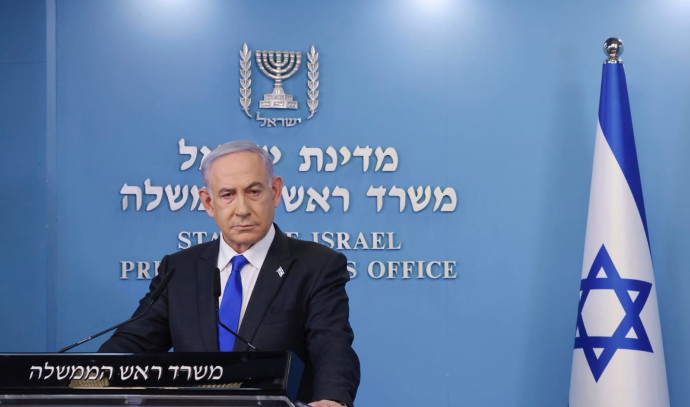


Comments
Post a Comment